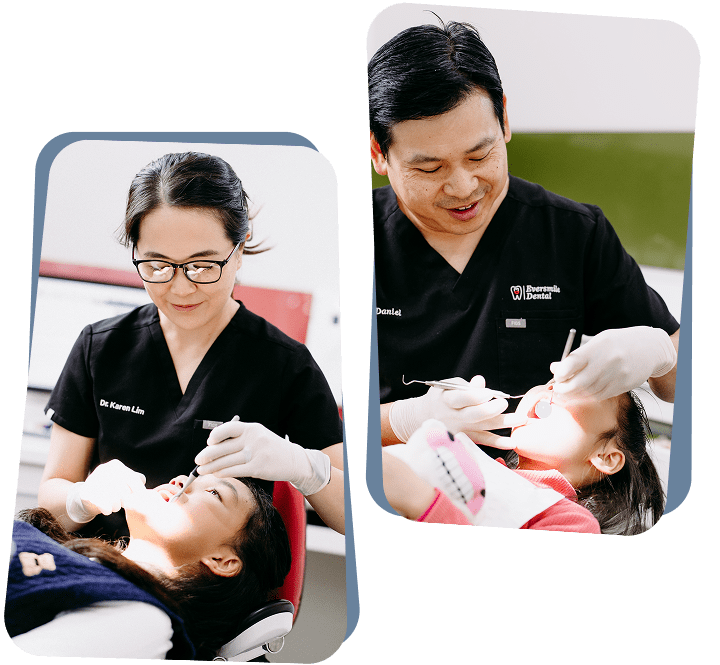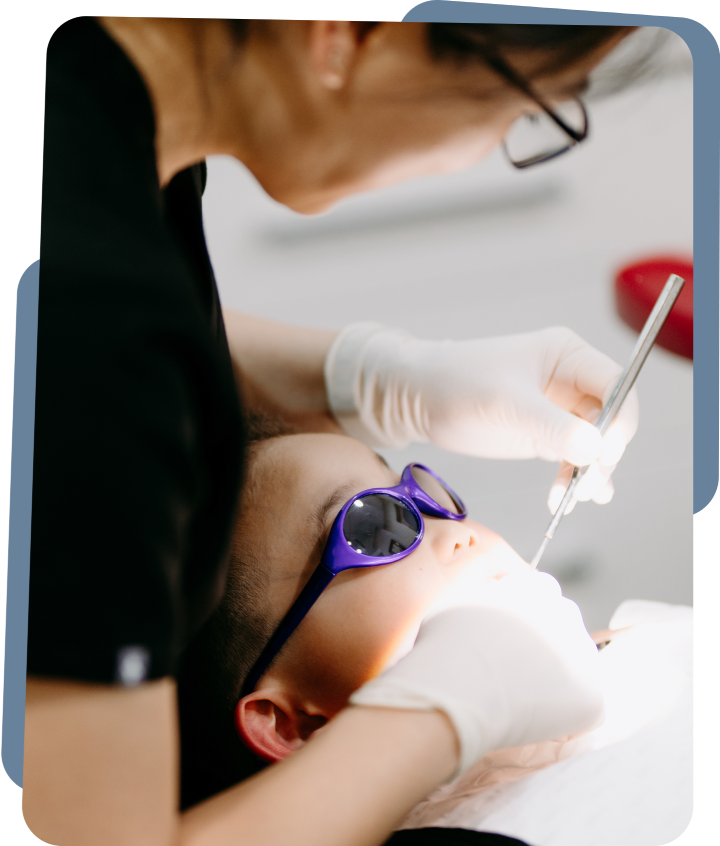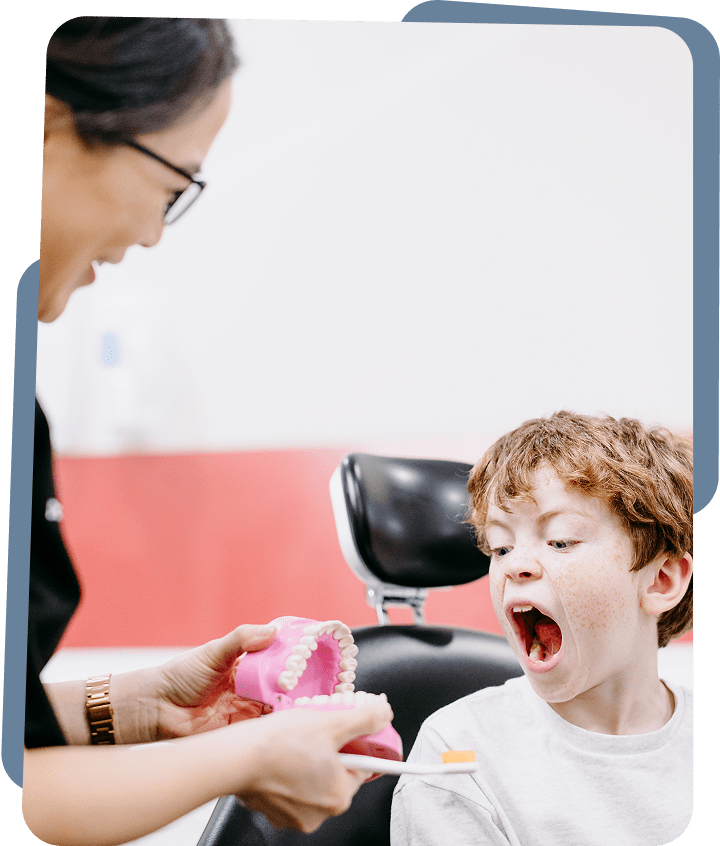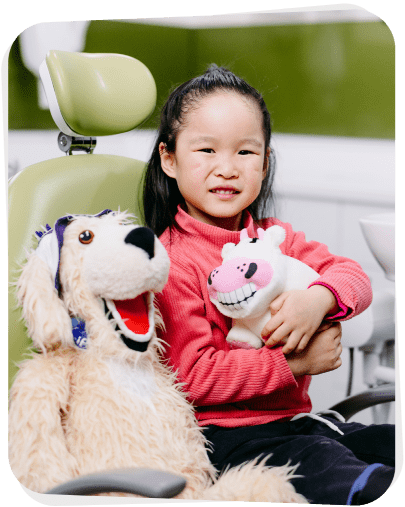Dental Care for Young Patients
Professional Children’s Tooth Extractions
in Bunbury

Why Your Child May Need a Tooth Removed
When Might a Child Need a Tooth Extraction?
- Over-Retained Teeth
When baby teeth don’t fall out naturally, they can block the eruption of adult teeth. Timely removal may help reduce the risk of crowding and may support better alignment as adult teeth begin to erupt.
- Severe Decay
Teeth with extensive decay that cannot be restored may need removal to reduce pain or infection risk. Extraction can also lower the chance of damage or bacterial spread to nearby baby and developing adult teeth.
- Dental Injury
A cracked or broken tooth from an accident may not heal well, especially if the root is damaged. Removing the tooth may reduce the risk of damage to surrounding teeth and support normal oral development.
- Orthodontic Needs
To create space before orthodontic treatment, a dentist may remove specific baby teeth. Baby tooth removal in Bunbury may assist adult teeth in moving into better alignment and support bite development as the jaw continues to grow.


How Tooth Extractions Support Your Child’s Oral Health
- Pain Relief
Severely decayed or damaged teeth may cause ongoing discomfort. Removing the affected tooth may relieve discomfort, helping your child eat, sleep, and speak more comfortably.
- Improved Alignment
When overcrowding affects the mouth, removing certain baby teeth may help adult teeth move into better positions. This may support improved bite development and may reduce the chance that orthodontic treatment could be required later.
- Infection Prevention
Teeth with advanced decay may lead to infection or abscesses. Experienced dentists for children’s dental extractions may help identify the source of infection and reduce the risk of bacteria affecting nearby teeth and developing adult teeth.
- Healthy Development
Kids’ dental extractions in Bunbury may support long-term oral health by making space for adult teeth to emerge. This may assist with balanced jaw development and may help maintain spacing as your child’s mouth grows.
We Accept CDBS—Check Your Child’s Eligibility
Eligibility is determined by Medicare. You can confirm your child’s status before booking an appointment— or contact our team, and we can help check eligibility. No referral is needed; just bring your Medicare details.

Our Approach to Children’s Dentistry in Bunbury
-
- Local Dental Care for Bunbury Kids
- We’re part of the Bunbury community, and many of us are parents ourselves. That means we understand local families, schools, and what makes kids feel supported. Our team has provided consistent dental care to local families for many years and is here for the long haul.
-
- Providing Children’s Dental Care in Bunbury Since 2006
- For nearly 20 years, we’ve cared for Bunbury kids with kindness, patience, and clinical know-how. We continue to support local families across generations, offering consistent care in a familiar setting. Our goal is to maintain high standards and constructive visits.
-
- Encouraging Positive Dental Habits in Children
- Children’s dentistry is about more than teeth—it’s about establishing healthy habits and helping children feel comfortable in the dental chair. We aim to provide a welcoming environment tailored to children’s needs. Whether your child is chatty or shy, nervous or fearless, we tailor every appointment to them. Plus, we offer checkups for the whole family in one spot—easy and convenient.
-
- Patient, Child-Focused Dentistry
- Appointments are scheduled with time for children to feel comfortable and ask questions. We explain procedures in clear, age-appropriate ways and adjust to each child’s needs. Every family is different, so we take the time to listen, provide clear information, and work together to make visits calm and constructive from the beginning.
-
- Professional Care for Children’s Oral Health
- Eversmile Dental is guided by clear values and professional standards in children’s dentistry. We provide care that is appropriate for each stage of development, with an emphasis on clear communication and general well-being. Families can expect a consistent approach that prioritises comfort, safety, and continuity of care over time.
-
- Modern Technology for Children’s Dentistry
- We use tools such as EMS Airflow, intraoral scanners, and low-radiation imaging to assist with diagnosis and treatment planning. These technologies can support accuracy and efficiency in dental care, but are always used alongside professional clinical judgement. Technology is part of the approach we take to providing appropriate care for each child.
Frequently Asked Questions
Is a tooth extraction painful for kids?
Children’s tooth extractions in Bunbury are usually not painful during the procedure because local anaesthetics are used. The area around the tooth is numbed, so your child should not feel sharp pain, but may notice some pressure or movement.
After the anaesthetic wears off, mild soreness or discomfort is common. Discomfort may last one to two days, depending on the child, and can generally be managed with over-the-counter pain relief if recommended by your dentist. Pain levels vary from child to child. Some children feel mild discomfort, while others may be more sensitive during recovery.
To support your child’s recovery, closely follow your dentist’s aftercare instructions, especially during the first 24 hours.
How do I prepare my child for a tooth extraction?
Helping your child feel calm and prepared can reduce anxiety and support them during the procedure and recovery. Here are practical steps to guide you before the appointment:
- Talk to your child in simple terms:
Let them know the dentist will remove a tooth that needs to come out. Avoid using words like “needle” or “pull,” which may sound frightening. Focus on how the procedure may help keep their mouth healthy. - Stay calm and confident:
Children often take emotional cues from adults. Speak calmly and avoid showing nervousness. Reassurance, conveyed through your tone and presence, can help them feel comfortable. - Encourage a good night’s sleep:
A well-rested child is more likely to feel settled on the day of the appointment. Aim for their regular bedtime routine the night before. - Follow pre-visit instructions:
If the dentist provides any dietary or medication advice (such as avoiding food before a sedative), follow these carefully. Not all extractions require fasting, so ask if you’re uncertain. - Dress comfortably:
Cosy clothes, such as a soft jumper or pyjamas (if allowed), can help your child feel at ease in the chair. - Bring a comforting item:
A favourite soft toy or blanket may help your child feel safe in a new environment.
Are children put to sleep for tooth extractions?
Some children may require sedation or a general anaesthetic for tooth extraction, depending on their needs. A local anaesthetic often provides sufficient pain control for a simple extraction. This numbs the area around the tooth so your child stays awake and should not feel sharp pain, though they may notice pressure or movement.
For children who are especially anxious or have special needs, the dentist might recommend sedation. It may also be considered for more complex procedures, such as removing multiple teeth or an impacted baby tooth. Sedation may be recommended when clinically appropriate and will be discussed with you before the procedure. The dentist will assess your child’s age, medical history, and comfort level before recommending a sedation approach.
Can I request general anaesthesia for my child?
You can ask about general anaesthesia, although it is not commonly used for extractions and is considered only when clinically appropriate. The decision depends on your child’s individual needs and the nature of the procedure. This option is only available in approved facilities where it is performed by appropriately trained professionals. This usually involves a referral, with the procedure performed in a hospital setting under continuous monitoring. The dentist or oral health provider will assess several factors before recommending general anaesthesia, including:
- Your child’s age and ability to cope:
Younger children or those who find it difficult to stay still may occasionally require deeper sedation. - Medical history and overall health:
Existing conditions, such as asthma, may affect which sedation methods are safe to use. - Risks and benefits:
The dentist will consider each option’s benefits and risks based on your child’s situation.
How long does it take a child to recover from a tooth extraction?
Recovery usually takes 3 to 5 days, though this varies among children. The initial healing phase often takes 24 to 48 hours, though this can differ between children. Your child may feel mild soreness during this time, especially once the local anaesthetic wears off. Tenderness may continue for up to five days, but symptoms often improve as healing progresses and with appropriate care. Here’s what to expect during recovery:
- Days 1 to 2:
Mild swelling, slight bleeding, or tenderness around the site is common. Encourage rest and offer soft, cool foods such as mashed potatoes or lukewarm soup. - Days 3 to 5:
By this stage, most children can return to their usual activities as discomfort tends to lessen. - Complete healing:
In most cases, the gum may close over within 1 to 2 weeks, depending on the extraction site and the rate of healing.
What can kids eat after a tooth extraction?
After the kids’ dental extractions in Bunbury, children are usually advised to eat soft, cool or lukewarm foods that won’t irritate the area. Recommended foods include:
- Mashed potatoes:
Soft and easy to eat, with little chewing required near the extraction site. - Yoghurt:
Cool and soothing, with no need for chewing. - Smoothies (without a straw):
These are easy to drink, but straws should be avoided as suction can dislodge the blood clot. - Soup (lukewarm):
Blended vegetable soups are ideal. Serve them lukewarm, as hot food may irritate the area. - Scrambled eggs:
Soft and easy to chew. - Pasta or noodles:
Well-cooked and soft, without spicy sauces. - Custard or jelly:
Generally easy for children to eat.
Encourage your child to chew on the opposite side of the mouth and offer small, frequent meals. As healing progresses, often over several days, more foods, such as soft sandwiches or steamed vegetables, can be gradually reintroduced.
How do I comfort my child after dental surgery?
Providing comfort for your child after dental surgery involves physical care, emotional support, and a calm environment that promotes healing. Recovery experiences vary. Offering calm support and following aftercare advice may help your child feel more at ease. Here are helpful ways to support your child during recovery:
- Stay close and offer reassurance:
Your presence alone can help reduce anxiety. Speak gently and let them know it’s okay to rest and take things slowly. - Manage discomfort carefully:
Follow your dentist’s recommendations, which may include pain relief or other strategies. A cold compress placed gently on the cheek can help reduce swelling. - Create a calm environment:
Provide a quiet space for rest that includes their favourite blanket, soft toy, or book. Avoid loud activities or anything that could increase stress. - Stick to soft foods:
Offer meals like yoghurt, mashed vegetables, or custard. These foods are easier to manage while healing. - Offer small sips of water:
Staying hydrated is important, but avoid straws for the first 24 hours to protect the healing site. - Encourage distraction through activities:
Watching a movie, drawing, or listening to calming music can shift focus away from discomfort.
Is it bad to pull a child’s tooth out at home?
It may be reasonable to allow a very loose baby tooth to come out naturally at home, provided it is already close to falling out. If a baby’s tooth is very loose, it may fall out naturally through normal activities, such as chewing or soft brushing, without any intervention. Forcing a tooth out before it is ready can cause pain, bleeding, or injury to the surrounding gums.
If you’re uncertain whether a tooth is ready, it’s better to ask your dentist. Sometimes, a baby’s tooth may not fall out naturally. In some cases, professional removal may be required, particularly if the tooth is affected by decay or preventing an adult tooth from coming through. Allowing teeth to fall out naturally or seeking a dentist’s advice may help reduce discomfort and lower the risk of complications.
What are the risks of not getting a tooth extracted?
Postponing or avoiding a recommended tooth extraction can increase the risk of oral health problems, particularly if the tooth is infected, damaged, or is affecting developing teeth. Here are some risks if a problematic tooth is not removed:
- Pain or swelling:
A damaged or infected tooth can cause ongoing discomfort, which may worsen over time. - Infection:
Infected baby teeth can spread bacteria to the surrounding tissues or even affect developing adult teeth. - Crowding or alignment issues:
If a baby tooth does not fall out on time, it can block an adult tooth, which may contribute to crowding or misalignment. - Damage to nearby teeth:
A decayed or infected tooth may affect the health of adjacent teeth and gums. - Difficulty chewing or eating:
A painful or loose tooth may make eating more difficult and limit your child’s food choices.
How long does it take for kids’ teeth to grow back after being pulled?
If a baby tooth is removed, the adult tooth underneath typically takes time to come through. Adult teeth usually emerge within 6 to 12 months, but this timeframe can extend up to 18 months, particularly if the baby tooth was removed earlier than usual. Several factors can influence how quickly the new tooth develops or appears:
- Your child’s age and stage of dental development:
Children lose baby teeth at different ages. If a tooth is removed before it becomes loose, the adult tooth may not yet be ready to emerge. - Which tooth was removed:
Front teeth (such as incisors) tend to erupt earlier, while molars usually appear later in a child’s dental development. - Whether the adult tooth is ready to come through:
If the adult tooth underneath hasn’t fully developed or moved into position, it may take longer to erupt.
Various Payment Options Available
Eversmile Dental offers a range of flexible payment options to assist patients in managing the cost of their dental care. Please ask our team for details about the payment plans available.
Book Your Appointment Online or Call Our Bunbury Dental Clinic
Book an appointment with our dentist in Bunbury to discuss your oral health needs. We provide tailored dental treatments and clear information to support informed decisions about your dental care.
